Hidden Silent Conflict
Turns out there is much to say about silence in conflict.
Why do we say, some things are better left unsaid? Is that always wise?
This week I was introduced to the phrase Silent Conflict.
Silent conflict is a type of conflict that largely remains unseen and creates the conditions that prevent peaceful co-existence among people. Tension is felt in silent conflict and there a strong chance that it will escalate if the conditions don't evolve. In conflict theory it is also called latent conflict.
Put simply,
silent conflict refers to the latent tension created and felt when conditions are not right for peaceful co-existence.
Now, if you think about it, silence is typically understood as a non-event. It is reflected in the absence of something. Sometimes that something is not even noticed as absent.
When things are left unsaid, reactions are not expressed, something is amiss. This is noticeable and felt - often in varying degrees. This is so with silent conflict.
Consider these examples:
There is a new leader on board, with a noticeable enthusiasm. The people who work on this team miss their prior leader who was trusted and revered.
One spouse shares considerably less about their own life than the other
One language is a core identity marker in a country. In that country there are minority communities who don't speak this one language.
You might conclude that these are not conflicts, only differences. Yet, in these scenarios tensions may be felt (at varying strengths, over a course of time) and could escalate.
Here are some indicators of silent conflict:
There may be hidden frustrations
There may be conflicting values
There may be different perspectives on the situation
There are perceived differences that are not shared
Policies reflect only the priorities of the majority
Change happens without communication or support
A choice is made to not speak at all
Silence is used as a strategy to keep the peace
Initial acts of silence become patterns of silence
Silencing becomes an unexamined habit
Complex dynamics form a web of interconnected dynamics
Each of us know these tendencies in our familial relationships, in our workplaces, in our political and cultural tendencies.
Common-sense dictates that sometimes it is better to not share perceived differences, sometimes it is better to not speak at all. And of course there is some validity in that.
I have chosen silence many times and continue to struggle with its hidden complexities, felt at war with myself and at loss with others, trapped in misunderstandings, i have been silenced amidst complex dynamics in relationships, and too often than I would have liked, chosen silence out of fear and confusion. Silence is an insidious habit in my family system.
I share all this to illustrate -
what is not said is palpable and real, and when it is not witnessed or welcomed, things escalate.
Conflict worsens and gets unmanageable, and this is when it is no longer hidden, this is also when people call conflict resolvers.
Silent conflict is rarely brought to mediation room.
So I'll let you in on a secret that might put me out of business. A sneak peak into the early ABC's conflict resolvers are taught.
A: Conflict is normal
B: Conflict has destructive and constructive potential
C: We must leverage the positive potential in conflict to transform it
This applies to silent conflict too. How do we maneuver these complexities?
Here are some questions to ask when you sense silent conflict:
What feels amiss?
What is felt and unspeakable here? now?
What and who is being silenced, intentionally or habitually?
How much are we consciously engaging with differences?
Which policies no longer serve us?
Am I, are we being silent temporarily or choosing silence as a habit?
Is there a pattern of not speaking up that has made many people invisible?
Have we gone too far, crossed a threshold, and does it feel too difficult to turn back?
What are the norms that prevent courageous engagement with difference?
What are the strengths implicit in this system that can help us speak to what is silent?
Can silence be a valuable strategy for moving forward sometimes? Yes! It is the habit of silence, silencing, what is felt and unexamined that escalates conflict.
What becomes habitual becomes hidden, harder to identify, track and shift. And then that becomes a loop in which silent conflict festers, worsens.
A working/workable relationship, a workplace culture, a political system.... are characterized by low levels of silencing and a high tolerance for surfacing of differences - especially when they are unspoken.
There is more to say about all of this. Why do we choose silences? What are the ways to break insidious silence? What is the wisdom in silence? Isn't silence beautiful especially when there is understanding?


